Analyzing Internet Usage Patterns Among Diverse Demographics
VerifiedAdded on 2020/05/28
|5
|2324
|36
AI Summary
The study delves into internet usage trends among diverse populations by examining literature from multiple disciplines. It highlights factors such as self-control dilemmas in mobile internet use, demographic influences on addiction, and the role of digital technology in organizational change. Economic implications are discussed through electricity consumption correlations with internet activity. Additionally, it addresses eHealth adoption across Europe using a multidimensional approach. The paper also explores cosmopolitanism linked to internet usage in European contexts, providing a comprehensive view of how different demographics interact with digital technologies.
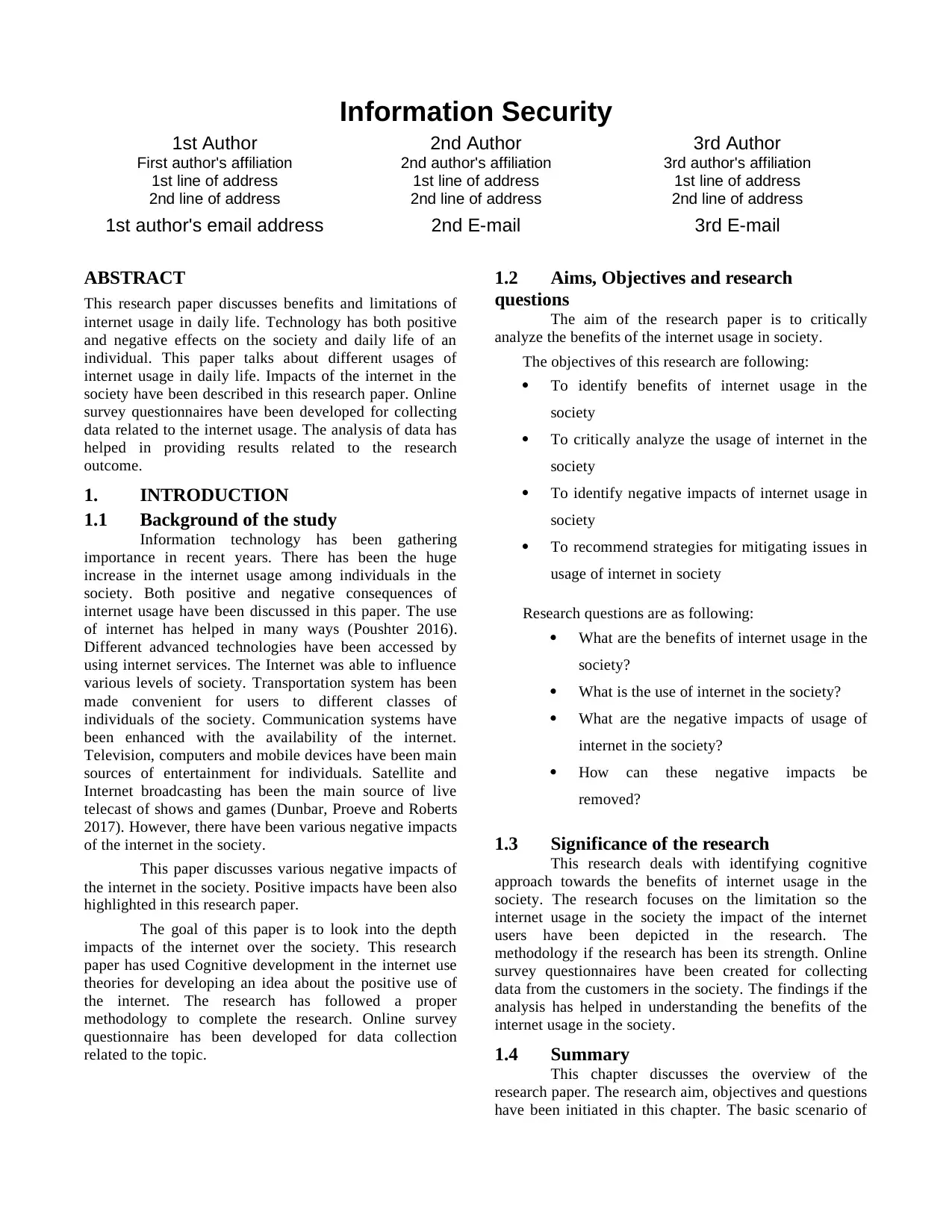
Information Security
1st Author
First author's affiliation
1st line of address
2nd line of address
1st author's email address
2nd Author
2nd author's affiliation
1st line of address
2nd line of address
2nd E-mail
3rd Author
3rd author's affiliation
1st line of address
2nd line of address
3rd E-mail
ABSTRACT
This research paper discusses benefits and limitations of
internet usage in daily life. Technology has both positive
and negative effects on the society and daily life of an
individual. This paper talks about different usages of
internet usage in daily life. Impacts of the internet in the
society have been described in this research paper. Online
survey questionnaires have been developed for collecting
data related to the internet usage. The analysis of data has
helped in providing results related to the research
outcome.
1. INTRODUCTION
1.1 Background of the study
Information technology has been gathering
importance in recent years. There has been the huge
increase in the internet usage among individuals in the
society. Both positive and negative consequences of
internet usage have been discussed in this paper. The use
of internet has helped in many ways (Poushter 2016).
Different advanced technologies have been accessed by
using internet services. The Internet was able to influence
various levels of society. Transportation system has been
made convenient for users to different classes of
individuals of the society. Communication systems have
been enhanced with the availability of the internet.
Television, computers and mobile devices have been main
sources of entertainment for individuals. Satellite and
Internet broadcasting has been the main source of live
telecast of shows and games (Dunbar, Proeve and Roberts
2017). However, there have been various negative impacts
of the internet in the society.
This paper discusses various negative impacts of
the internet in the society. Positive impacts have been also
highlighted in this research paper.
The goal of this paper is to look into the depth
impacts of the internet over the society. This research
paper has used Cognitive development in the internet use
theories for developing an idea about the positive use of
the internet. The research has followed a proper
methodology to complete the research. Online survey
questionnaire has been developed for data collection
related to the topic.
1.2 Aims, Objectives and research
questions
The aim of the research paper is to critically
analyze the benefits of the internet usage in society.
The objectives of this research are following:
To identify benefits of internet usage in the
society
To critically analyze the usage of internet in the
society
To identify negative impacts of internet usage in
society
To recommend strategies for mitigating issues in
usage of internet in society
Research questions are as following:
What are the benefits of internet usage in the
society?
What is the use of internet in the society?
What are the negative impacts of usage of
internet in the society?
How can these negative impacts be
removed?
1.3 Significance of the research
This research deals with identifying cognitive
approach towards the benefits of internet usage in the
society. The research focuses on the limitation so the
internet usage in the society the impact of the internet
users have been depicted in the research. The
methodology if the research has been its strength. Online
survey questionnaires have been created for collecting
data from the customers in the society. The findings if the
analysis has helped in understanding the benefits of the
internet usage in the society.
1.4 Summary
This chapter discusses the overview of the
research paper. The research aim, objectives and questions
have been initiated in this chapter. The basic scenario of
1st Author
First author's affiliation
1st line of address
2nd line of address
1st author's email address
2nd Author
2nd author's affiliation
1st line of address
2nd line of address
2nd E-mail
3rd Author
3rd author's affiliation
1st line of address
2nd line of address
3rd E-mail
ABSTRACT
This research paper discusses benefits and limitations of
internet usage in daily life. Technology has both positive
and negative effects on the society and daily life of an
individual. This paper talks about different usages of
internet usage in daily life. Impacts of the internet in the
society have been described in this research paper. Online
survey questionnaires have been developed for collecting
data related to the internet usage. The analysis of data has
helped in providing results related to the research
outcome.
1. INTRODUCTION
1.1 Background of the study
Information technology has been gathering
importance in recent years. There has been the huge
increase in the internet usage among individuals in the
society. Both positive and negative consequences of
internet usage have been discussed in this paper. The use
of internet has helped in many ways (Poushter 2016).
Different advanced technologies have been accessed by
using internet services. The Internet was able to influence
various levels of society. Transportation system has been
made convenient for users to different classes of
individuals of the society. Communication systems have
been enhanced with the availability of the internet.
Television, computers and mobile devices have been main
sources of entertainment for individuals. Satellite and
Internet broadcasting has been the main source of live
telecast of shows and games (Dunbar, Proeve and Roberts
2017). However, there have been various negative impacts
of the internet in the society.
This paper discusses various negative impacts of
the internet in the society. Positive impacts have been also
highlighted in this research paper.
The goal of this paper is to look into the depth
impacts of the internet over the society. This research
paper has used Cognitive development in the internet use
theories for developing an idea about the positive use of
the internet. The research has followed a proper
methodology to complete the research. Online survey
questionnaire has been developed for data collection
related to the topic.
1.2 Aims, Objectives and research
questions
The aim of the research paper is to critically
analyze the benefits of the internet usage in society.
The objectives of this research are following:
To identify benefits of internet usage in the
society
To critically analyze the usage of internet in the
society
To identify negative impacts of internet usage in
society
To recommend strategies for mitigating issues in
usage of internet in society
Research questions are as following:
What are the benefits of internet usage in the
society?
What is the use of internet in the society?
What are the negative impacts of usage of
internet in the society?
How can these negative impacts be
removed?
1.3 Significance of the research
This research deals with identifying cognitive
approach towards the benefits of internet usage in the
society. The research focuses on the limitation so the
internet usage in the society the impact of the internet
users have been depicted in the research. The
methodology if the research has been its strength. Online
survey questionnaires have been created for collecting
data from the customers in the society. The findings if the
analysis has helped in understanding the benefits of the
internet usage in the society.
1.4 Summary
This chapter discusses the overview of the
research paper. The research aim, objectives and questions
have been initiated in this chapter. The basic scenario of
Paraphrase This Document
Need a fresh take? Get an instant paraphrase of this document with our AI Paraphraser
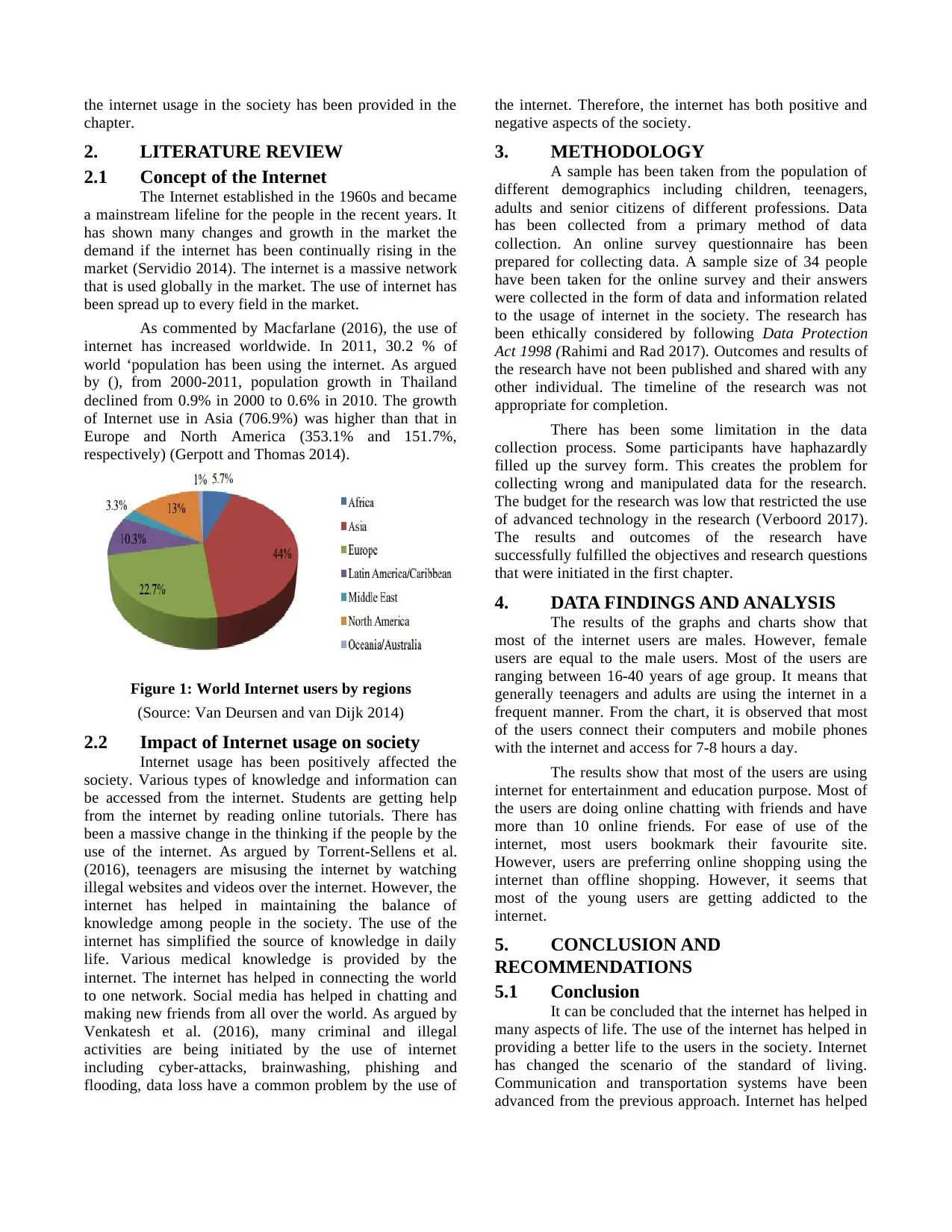
the internet usage in the society has been provided in the
chapter.
2. LITERATURE REVIEW
2.1 Concept of the Internet
The Internet established in the 1960s and became
a mainstream lifeline for the people in the recent years. It
has shown many changes and growth in the market the
demand if the internet has been continually rising in the
market (Servidio 2014). The internet is a massive network
that is used globally in the market. The use of internet has
been spread up to every field in the market.
As commented by Macfarlane (2016), the use of
internet has increased worldwide. In 2011, 30.2 % of
world ‘population has been using the internet. As argued
by (), from 2000-2011, population growth in Thailand
declined from 0.9% in 2000 to 0.6% in 2010. The growth
of Internet use in Asia (706.9%) was higher than that in
Europe and North America (353.1% and 151.7%,
respectively) (Gerpott and Thomas 2014).
Figure 1: World Internet users by regions
(Source: Van Deursen and van Dijk 2014)
2.2 Impact of Internet usage on society
Internet usage has been positively affected the
society. Various types of knowledge and information can
be accessed from the internet. Students are getting help
from the internet by reading online tutorials. There has
been a massive change in the thinking if the people by the
use of the internet. As argued by Torrent-Sellens et al.
(2016), teenagers are misusing the internet by watching
illegal websites and videos over the internet. However, the
internet has helped in maintaining the balance of
knowledge among people in the society. The use of the
internet has simplified the source of knowledge in daily
life. Various medical knowledge is provided by the
internet. The internet has helped in connecting the world
to one network. Social media has helped in chatting and
making new friends from all over the world. As argued by
Venkatesh et al. (2016), many criminal and illegal
activities are being initiated by the use of internet
including cyber-attacks, brainwashing, phishing and
flooding, data loss have a common problem by the use of
the internet. Therefore, the internet has both positive and
negative aspects of the society.
3. METHODOLOGY
A sample has been taken from the population of
different demographics including children, teenagers,
adults and senior citizens of different professions. Data
has been collected from a primary method of data
collection. An online survey questionnaire has been
prepared for collecting data. A sample size of 34 people
have been taken for the online survey and their answers
were collected in the form of data and information related
to the usage of internet in the society. The research has
been ethically considered by following Data Protection
Act 1998 (Rahimi and Rad 2017). Outcomes and results of
the research have not been published and shared with any
other individual. The timeline of the research was not
appropriate for completion.
There has been some limitation in the data
collection process. Some participants have haphazardly
filled up the survey form. This creates the problem for
collecting wrong and manipulated data for the research.
The budget for the research was low that restricted the use
of advanced technology in the research (Verboord 2017).
The results and outcomes of the research have
successfully fulfilled the objectives and research questions
that were initiated in the first chapter.
4. DATA FINDINGS AND ANALYSIS
The results of the graphs and charts show that
most of the internet users are males. However, female
users are equal to the male users. Most of the users are
ranging between 16-40 years of age group. It means that
generally teenagers and adults are using the internet in a
frequent manner. From the chart, it is observed that most
of the users connect their computers and mobile phones
with the internet and access for 7-8 hours a day.
The results show that most of the users are using
internet for entertainment and education purpose. Most of
the users are doing online chatting with friends and have
more than 10 online friends. For ease of use of the
internet, most users bookmark their favourite site.
However, users are preferring online shopping using the
internet than offline shopping. However, it seems that
most of the young users are getting addicted to the
internet.
5. CONCLUSION AND
RECOMMENDATIONS
5.1 Conclusion
It can be concluded that the internet has helped in
many aspects of life. The use of the internet has helped in
providing a better life to the users in the society. Internet
has changed the scenario of the standard of living.
Communication and transportation systems have been
advanced from the previous approach. Internet has helped
chapter.
2. LITERATURE REVIEW
2.1 Concept of the Internet
The Internet established in the 1960s and became
a mainstream lifeline for the people in the recent years. It
has shown many changes and growth in the market the
demand if the internet has been continually rising in the
market (Servidio 2014). The internet is a massive network
that is used globally in the market. The use of internet has
been spread up to every field in the market.
As commented by Macfarlane (2016), the use of
internet has increased worldwide. In 2011, 30.2 % of
world ‘population has been using the internet. As argued
by (), from 2000-2011, population growth in Thailand
declined from 0.9% in 2000 to 0.6% in 2010. The growth
of Internet use in Asia (706.9%) was higher than that in
Europe and North America (353.1% and 151.7%,
respectively) (Gerpott and Thomas 2014).
Figure 1: World Internet users by regions
(Source: Van Deursen and van Dijk 2014)
2.2 Impact of Internet usage on society
Internet usage has been positively affected the
society. Various types of knowledge and information can
be accessed from the internet. Students are getting help
from the internet by reading online tutorials. There has
been a massive change in the thinking if the people by the
use of the internet. As argued by Torrent-Sellens et al.
(2016), teenagers are misusing the internet by watching
illegal websites and videos over the internet. However, the
internet has helped in maintaining the balance of
knowledge among people in the society. The use of the
internet has simplified the source of knowledge in daily
life. Various medical knowledge is provided by the
internet. The internet has helped in connecting the world
to one network. Social media has helped in chatting and
making new friends from all over the world. As argued by
Venkatesh et al. (2016), many criminal and illegal
activities are being initiated by the use of internet
including cyber-attacks, brainwashing, phishing and
flooding, data loss have a common problem by the use of
the internet. Therefore, the internet has both positive and
negative aspects of the society.
3. METHODOLOGY
A sample has been taken from the population of
different demographics including children, teenagers,
adults and senior citizens of different professions. Data
has been collected from a primary method of data
collection. An online survey questionnaire has been
prepared for collecting data. A sample size of 34 people
have been taken for the online survey and their answers
were collected in the form of data and information related
to the usage of internet in the society. The research has
been ethically considered by following Data Protection
Act 1998 (Rahimi and Rad 2017). Outcomes and results of
the research have not been published and shared with any
other individual. The timeline of the research was not
appropriate for completion.
There has been some limitation in the data
collection process. Some participants have haphazardly
filled up the survey form. This creates the problem for
collecting wrong and manipulated data for the research.
The budget for the research was low that restricted the use
of advanced technology in the research (Verboord 2017).
The results and outcomes of the research have
successfully fulfilled the objectives and research questions
that were initiated in the first chapter.
4. DATA FINDINGS AND ANALYSIS
The results of the graphs and charts show that
most of the internet users are males. However, female
users are equal to the male users. Most of the users are
ranging between 16-40 years of age group. It means that
generally teenagers and adults are using the internet in a
frequent manner. From the chart, it is observed that most
of the users connect their computers and mobile phones
with the internet and access for 7-8 hours a day.
The results show that most of the users are using
internet for entertainment and education purpose. Most of
the users are doing online chatting with friends and have
more than 10 online friends. For ease of use of the
internet, most users bookmark their favourite site.
However, users are preferring online shopping using the
internet than offline shopping. However, it seems that
most of the young users are getting addicted to the
internet.
5. CONCLUSION AND
RECOMMENDATIONS
5.1 Conclusion
It can be concluded that the internet has helped in
many aspects of life. The use of the internet has helped in
providing a better life to the users in the society. Internet
has changed the scenario of the standard of living.
Communication and transportation systems have been
advanced from the previous approach. Internet has helped
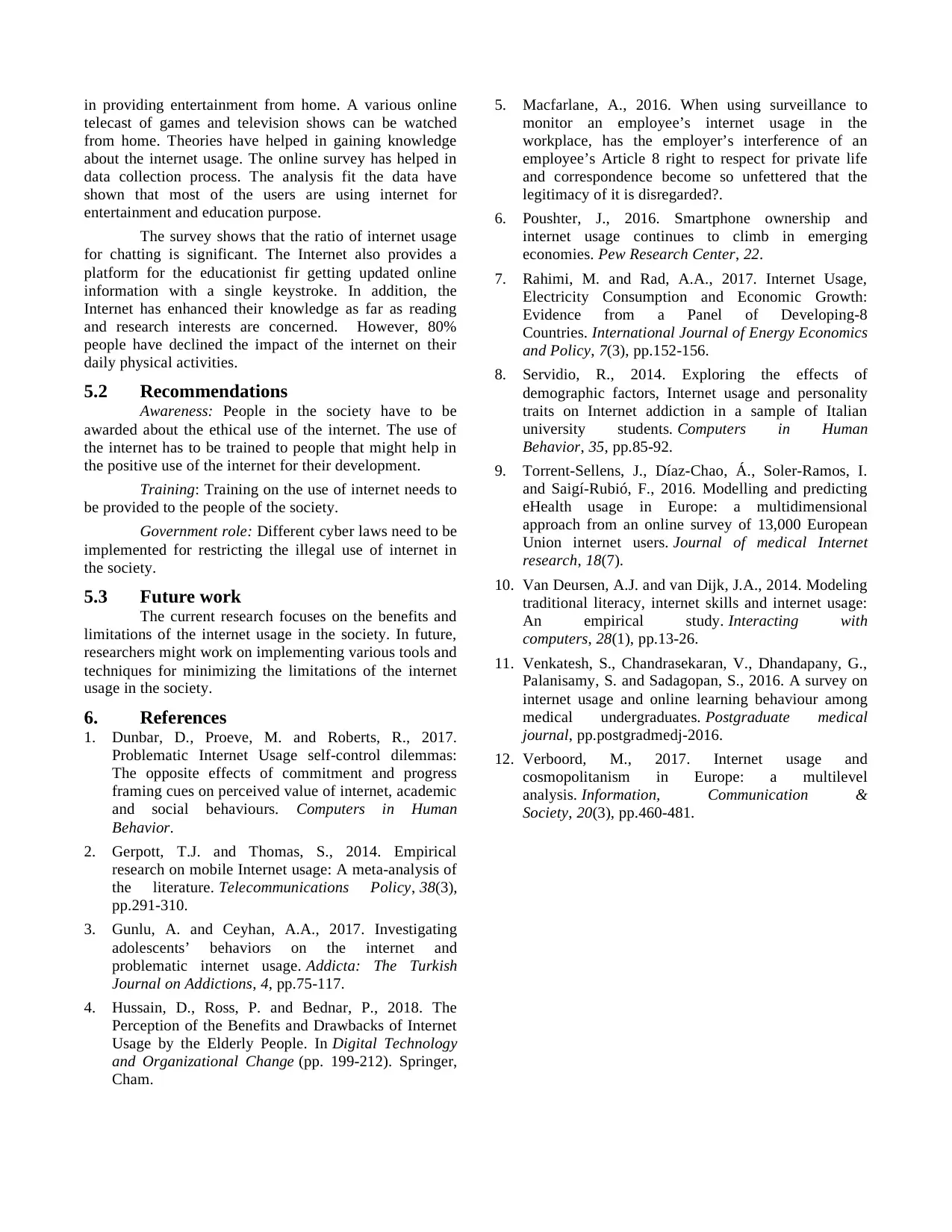
in providing entertainment from home. A various online
telecast of games and television shows can be watched
from home. Theories have helped in gaining knowledge
about the internet usage. The online survey has helped in
data collection process. The analysis fit the data have
shown that most of the users are using internet for
entertainment and education purpose.
The survey shows that the ratio of internet usage
for chatting is significant. The Internet also provides a
platform for the educationist fir getting updated online
information with a single keystroke. In addition, the
Internet has enhanced their knowledge as far as reading
and research interests are concerned. However, 80%
people have declined the impact of the internet on their
daily physical activities.
5.2 Recommendations
Awareness: People in the society have to be
awarded about the ethical use of the internet. The use of
the internet has to be trained to people that might help in
the positive use of the internet for their development.
Training: Training on the use of internet needs to
be provided to the people of the society.
Government role: Different cyber laws need to be
implemented for restricting the illegal use of internet in
the society.
5.3 Future work
The current research focuses on the benefits and
limitations of the internet usage in the society. In future,
researchers might work on implementing various tools and
techniques for minimizing the limitations of the internet
usage in the society.
6. References
1. Dunbar, D., Proeve, M. and Roberts, R., 2017.
Problematic Internet Usage self-control dilemmas:
The opposite effects of commitment and progress
framing cues on perceived value of internet, academic
and social behaviours. Computers in Human
Behavior.
2. Gerpott, T.J. and Thomas, S., 2014. Empirical
research on mobile Internet usage: A meta-analysis of
the literature. Telecommunications Policy, 38(3),
pp.291-310.
3. Gunlu, A. and Ceyhan, A.A., 2017. Investigating
adolescents’ behaviors on the internet and
problematic internet usage. Addicta: The Turkish
Journal on Addictions, 4, pp.75-117.
4. Hussain, D., Ross, P. and Bednar, P., 2018. The
Perception of the Benefits and Drawbacks of Internet
Usage by the Elderly People. In Digital Technology
and Organizational Change (pp. 199-212). Springer,
Cham.
5. Macfarlane, A., 2016. When using surveillance to
monitor an employee’s internet usage in the
workplace, has the employer’s interference of an
employee’s Article 8 right to respect for private life
and correspondence become so unfettered that the
legitimacy of it is disregarded?.
6. Poushter, J., 2016. Smartphone ownership and
internet usage continues to climb in emerging
economies. Pew Research Center, 22.
7. Rahimi, M. and Rad, A.A., 2017. Internet Usage,
Electricity Consumption and Economic Growth:
Evidence from a Panel of Developing-8
Countries. International Journal of Energy Economics
and Policy, 7(3), pp.152-156.
8. Servidio, R., 2014. Exploring the effects of
demographic factors, Internet usage and personality
traits on Internet addiction in a sample of Italian
university students. Computers in Human
Behavior, 35, pp.85-92.
9. Torrent-Sellens, J., Díaz-Chao, Á., Soler-Ramos, I.
and Saigí-Rubió, F., 2016. Modelling and predicting
eHealth usage in Europe: a multidimensional
approach from an online survey of 13,000 European
Union internet users. Journal of medical Internet
research, 18(7).
10. Van Deursen, A.J. and van Dijk, J.A., 2014. Modeling
traditional literacy, internet skills and internet usage:
An empirical study. Interacting with
computers, 28(1), pp.13-26.
11. Venkatesh, S., Chandrasekaran, V., Dhandapany, G.,
Palanisamy, S. and Sadagopan, S., 2016. A survey on
internet usage and online learning behaviour among
medical undergraduates. Postgraduate medical
journal, pp.postgradmedj-2016.
12. Verboord, M., 2017. Internet usage and
cosmopolitanism in Europe: a multilevel
analysis. Information, Communication &
Society, 20(3), pp.460-481.
telecast of games and television shows can be watched
from home. Theories have helped in gaining knowledge
about the internet usage. The online survey has helped in
data collection process. The analysis fit the data have
shown that most of the users are using internet for
entertainment and education purpose.
The survey shows that the ratio of internet usage
for chatting is significant. The Internet also provides a
platform for the educationist fir getting updated online
information with a single keystroke. In addition, the
Internet has enhanced their knowledge as far as reading
and research interests are concerned. However, 80%
people have declined the impact of the internet on their
daily physical activities.
5.2 Recommendations
Awareness: People in the society have to be
awarded about the ethical use of the internet. The use of
the internet has to be trained to people that might help in
the positive use of the internet for their development.
Training: Training on the use of internet needs to
be provided to the people of the society.
Government role: Different cyber laws need to be
implemented for restricting the illegal use of internet in
the society.
5.3 Future work
The current research focuses on the benefits and
limitations of the internet usage in the society. In future,
researchers might work on implementing various tools and
techniques for minimizing the limitations of the internet
usage in the society.
6. References
1. Dunbar, D., Proeve, M. and Roberts, R., 2017.
Problematic Internet Usage self-control dilemmas:
The opposite effects of commitment and progress
framing cues on perceived value of internet, academic
and social behaviours. Computers in Human
Behavior.
2. Gerpott, T.J. and Thomas, S., 2014. Empirical
research on mobile Internet usage: A meta-analysis of
the literature. Telecommunications Policy, 38(3),
pp.291-310.
3. Gunlu, A. and Ceyhan, A.A., 2017. Investigating
adolescents’ behaviors on the internet and
problematic internet usage. Addicta: The Turkish
Journal on Addictions, 4, pp.75-117.
4. Hussain, D., Ross, P. and Bednar, P., 2018. The
Perception of the Benefits and Drawbacks of Internet
Usage by the Elderly People. In Digital Technology
and Organizational Change (pp. 199-212). Springer,
Cham.
5. Macfarlane, A., 2016. When using surveillance to
monitor an employee’s internet usage in the
workplace, has the employer’s interference of an
employee’s Article 8 right to respect for private life
and correspondence become so unfettered that the
legitimacy of it is disregarded?.
6. Poushter, J., 2016. Smartphone ownership and
internet usage continues to climb in emerging
economies. Pew Research Center, 22.
7. Rahimi, M. and Rad, A.A., 2017. Internet Usage,
Electricity Consumption and Economic Growth:
Evidence from a Panel of Developing-8
Countries. International Journal of Energy Economics
and Policy, 7(3), pp.152-156.
8. Servidio, R., 2014. Exploring the effects of
demographic factors, Internet usage and personality
traits on Internet addiction in a sample of Italian
university students. Computers in Human
Behavior, 35, pp.85-92.
9. Torrent-Sellens, J., Díaz-Chao, Á., Soler-Ramos, I.
and Saigí-Rubió, F., 2016. Modelling and predicting
eHealth usage in Europe: a multidimensional
approach from an online survey of 13,000 European
Union internet users. Journal of medical Internet
research, 18(7).
10. Van Deursen, A.J. and van Dijk, J.A., 2014. Modeling
traditional literacy, internet skills and internet usage:
An empirical study. Interacting with
computers, 28(1), pp.13-26.
11. Venkatesh, S., Chandrasekaran, V., Dhandapany, G.,
Palanisamy, S. and Sadagopan, S., 2016. A survey on
internet usage and online learning behaviour among
medical undergraduates. Postgraduate medical
journal, pp.postgradmedj-2016.
12. Verboord, M., 2017. Internet usage and
cosmopolitanism in Europe: a multilevel
analysis. Information, Communication &
Society, 20(3), pp.460-481.
⊘ This is a preview!⊘
Do you want full access?
Subscribe today to unlock all pages.

Trusted by 1+ million students worldwide
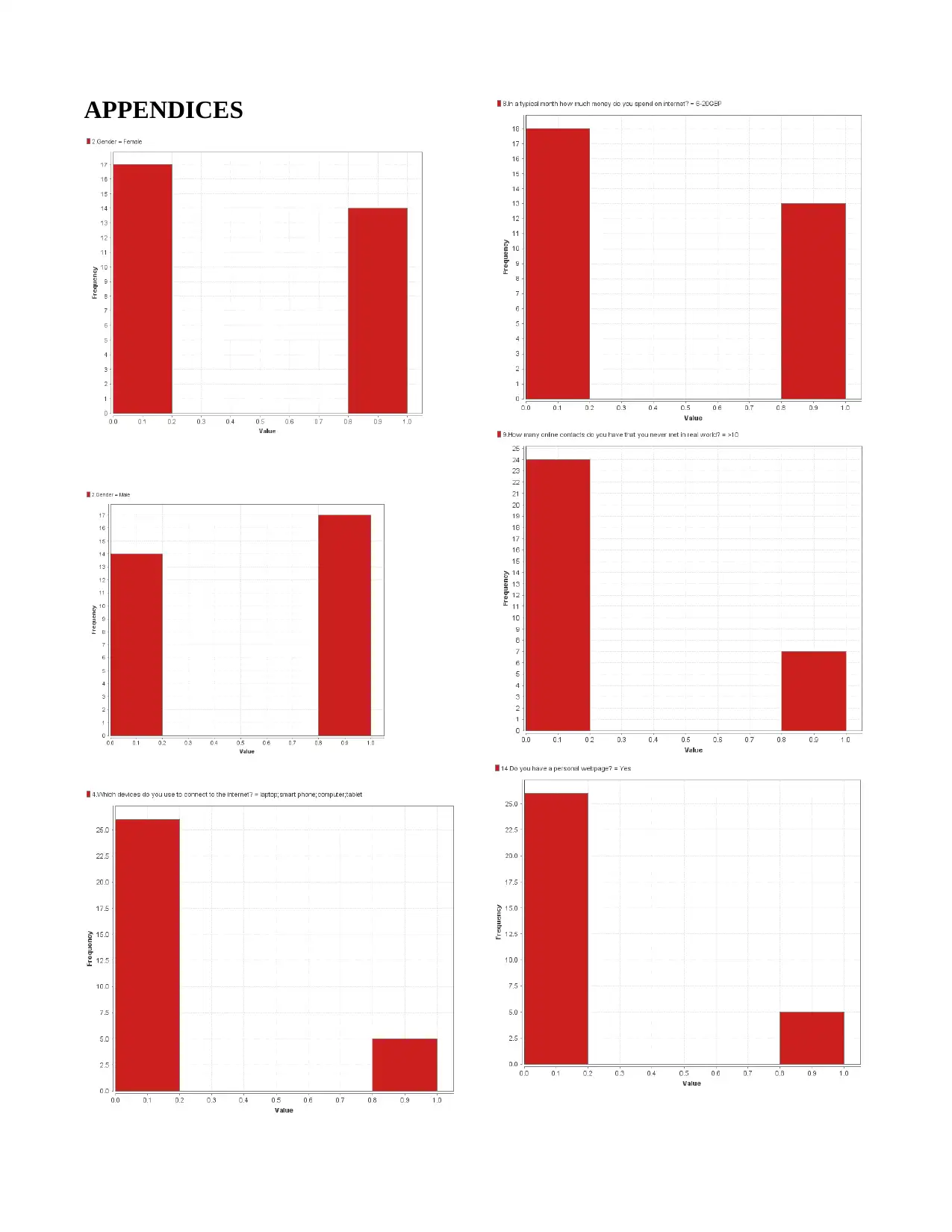
APPENDICES
Paraphrase This Document
Need a fresh take? Get an instant paraphrase of this document with our AI Paraphraser
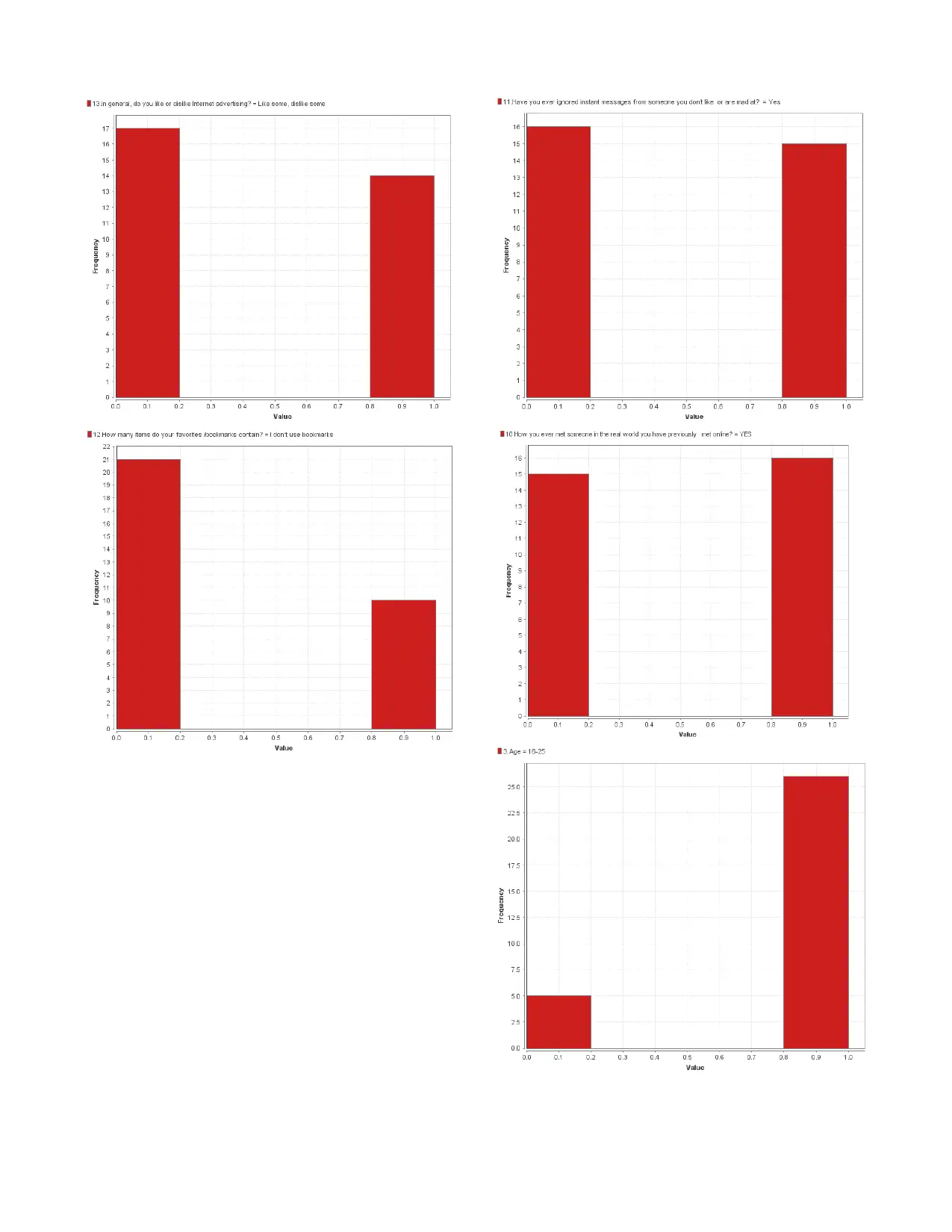
1 out of 5
Related Documents
Your All-in-One AI-Powered Toolkit for Academic Success.
+13062052269
info@desklib.com
Available 24*7 on WhatsApp / Email
![[object Object]](/_next/static/media/star-bottom.7253800d.svg)
Unlock your academic potential
Copyright © 2020–2026 A2Z Services. All Rights Reserved. Developed and managed by ZUCOL.





